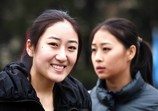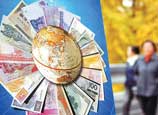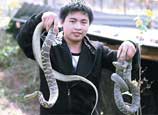
TOKYO, Feb. 25 (Xinhua) -- Japan's government has tapped Asian Development Bank (ADB) President Haruhiko Kuroda, 68, to succeed Masaaki Shirakawa as the Bank of Japan's (BOJ) governor, government sources stated Monday.
Kikuo Iwata, 70, a renowned economics academic with an astute knowledge of monetary policy, has been nominated to fill one of the two deputy governor positions, with BOJ Executive Director Hiroshi Nakaso, 59, tapped to fill the other, the sources said.
Natsuo Yamaguchi, head of the ruling Liberal Democratic Party's junior New Komeito coalition partner, told reporters Monday that he had been briefed by Prime Minister Shinzo Abe about the nominees for the central bank's top posts and told reporters the choices were in line with the party's expectations.
The government will submit its nominations for the new BOJ chief and the two deputies this week, Chief Cabinet Secretary Yoshihide Suga told a news conference Monday. The candidates will have to be approved by both houses of parliament -- the upper house in which the ruling bloc does not have a majority, in Japan' s bicameral system of parliament.
Some political wrangling will likely be involved for Abe's appointments to be approved, but the prime minister will either gain the support of the main opposition Democratic Party of Japan (DPJ) or a coterie of minor parties to see the nominations passed, sources close to the matter said.
"This is a critical time for Japan's economy, and we must avoid, at all costs, a failure to gain parliamentary approval for this appointment," Abe told ruling party executives.
In addition, Abe has said the new leader of the central bank should prioritize pumping more money into the economy and be able to negotiate with the leaders of other central banks.
Kuroda and Iwata are both staunch supporters of Abe's vigorous plans to beat Japan's decades-long, chronic deflation through aggressive monetary easing policy moves and support Abe's two percent inflation target.
Kuroda's extensive global connections stemming from his third term as president of the Manila-based Asian Development Bank since 2005 and experiences as vice minister for international affairs at Japan's Finance Ministry from 1999 to 2003, are seen as huge assets by Abe, as Kuroda will likely be able to deflect international criticism when the Bank's aggressive monetary policies are solely introduced to weaken the nation's currency and boost its sluggish export sector, according to leading economists.
To this point, Kuroda drew controversy during his tenure at the Finance Ministry when he decided to extend a program to weaken the yen through a 14-trillion-yen market intervention campaign, but was exceptionally adroit at fending off criticism from foreign countries, experts attest.
Iwata, for his part, a professor of economics at Tokyo's Gakushin University, has been a vocal critic of the BOJ's monetary policies up until now and has blamed the nation's deflation on lackluster moves by the central bank to further ease its monetary policy.
Iwata, widely regarded as "reflationist" economist, has for more than 10 years urged Japan's central bank to set an inflation target, which was finally achieved in January this year, and is also a proponent of the Bank purchasing long-term government bonds -- a move the bank has been reluctant to take previously.
Sources close to Iwata have said he wants to see the law ensuring the BOJ's autonomy from the government revised so the bank can respond directly to policy directives set by the government.
Iwata's stance here may draw criticism from current BOJ policy board members who believe the BOJ's independence from the government is indispensable.
Abe, himself a fiscal hawk, has said he wants to choose a new BOJ leadership willing to take radical and unconventional steps to help kick-start Japan's sluggish economy, that will go above and beyond the efforts made by incumbent BOJ Governor Masaaki Shirakawa and his senior policy board members.


















![]()
